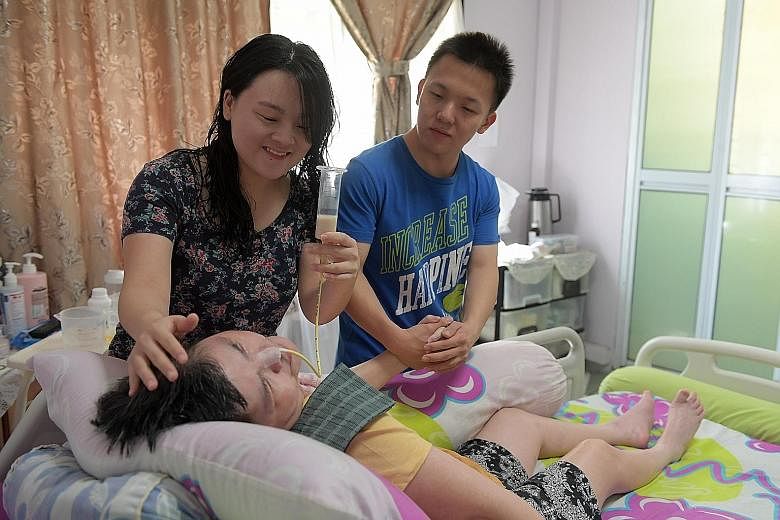Some nights, she tosses and turns, unable to catch forty winks. On others, she cries herself to sleep.
It is the long nights that are the toughest to get through for Ms Grace Koh, 29, who is a caregiver for both her aged parents.
Six years ago, her mother fell in a neighbourhood market and hit her head. The trauma to the brain left her bedridden and unable to talk.
Last month, her father also fell in the toilet and sustained a brain injury. He is undergoing rehabilitation in a community hospital now.
That meant that Ms Koh and her brother had to, on top of their full-time jobs, contend with looking after their parents who needed intensive care .
"At the end of a long day, I find that talking it over with a few close friends really helps," said Ms Koh.
"They give a different perspective to my worries and I feel reassured that I am not alone. There is a special rapport with friends who have gone through similar caregiving experiences," she added.
Ms Koh, who works in a non- profit organisation, has had to take much of her leave allotment, at times urgent leave, when medical appointments or emergencies arose.
She is currently on no-pay leave for a month to help take care of her parents.
The family also relies on a domestic worker.
Freelance arts practitioner Noorlinah Mohamed, however, found that her caregiving experience was contrary to the findings of the Duke-NUS Medical School's study, which found that having someone whom they trust to talk to reduces the degree of depressive symptoms that working caregivers face.
Back in 2010, when her mother was diagnosed with dementia, she was under so much strain that she found herself shaking her mother in a bid to make her come to her senses. Often, she felt like screaming in her own house.
Aware that she was not coping well, she went online and found a support group.
"I went for a few times but I found the people and atmosphere depressing," said Madam Noorlinah.
"Ironically, through the sharing done in the support group, I realised that the root of the problem for many people could simply be not having enough hands on deck.
"The emotional distress is a symptom of being overworked, and talking about it with someone only offers a temporary balm," she added.
So she stopped going to the group and hired two domestic workers to help with both her parents, as her father had a stroke last year and also needed care.
But Madam Noorlinah also acknowledges that emotional support is crucial.
"My domestic helpers play dual roles. Apart from doing the actual work like bathing and taking my parents out for walks, they are my close friends.
"I joke and strategise with them on how to care for my parents as they have grown to know my parents so well."


